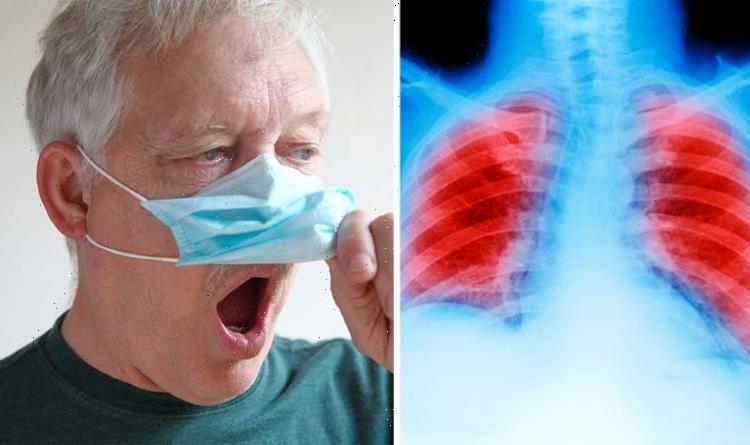Dr Chris discusses CT scans detecting lung cancer
We use your sign-up to provide content in ways you’ve consented to and to improve our understanding of you. This may include adverts from us and 3rd parties based on our understanding. You can unsubscribe at any time. More info
While every seven out of 10 cases of lung cancer can be attributed to smoking, people who do not smoke are also at risk of developing the deadly disease. Dr Mat Callister, a consultant of respiratory medicine at St James’ University Hospital in Leeds, highlighted “three of the most important lung cancer symptoms”. These being: breathlessness, a persistent cough (lasting for three weeks or more), and chest pain.
“GPs want to see patients with these symptoms,” said Dr Callister.
Yorkshire Cancer Research listed further symptoms of lung cancer to be aware of.
The main symptoms of lung cancer are:
- A cough that doesn’t go away after two or three weeks
- A long-standing cough that gets worse
- Chest infections that keep coming back
- Coughing up blood
- An ache or pain when breathing or coughing
- Persistent breathlessness
- Persistent tiredness or lack of energy
- Loss of appetite or unexplained weight loss.
“Lung cancer does not usually cause noticeable symptoms until it’s spread through the lungs or into other parts of the body,” the NHS warned.

“This means the outlook for the condition is not as good as many other types of cancer.”
Early diagnosis can make a “big difference” to a person’s longevity, so if you notice any warning signs of lung cancer, book an appointment with your doctor as soon as possible.
There are other “less common” signs of cancer that require a medical professional to investigate.
Such symptoms include:
- changes in the appearance of your fingers, such as becoming more curved or their ends becoming larger (this is known as finger clubbing)
- difficulty swallowing (dysphagia) or pain when swallowing
- wheezing
- A hoarse voice
- Swelling of your face or neck
- Persistent chest or shoulder pain.
Smoking
Accounting for 70 percent of lung cancer cases, it is vital to raise awareness of the dangers of smoking.
“Tobacco smoke contains more than 60 different toxic substances, which are known to be carcinogenic (cancer-producing),” the NHS stated.
Tobacco products, such as cigars, pipe tobacco, snuff, and chewing tobacco all increase the risk of lung cancer developing.
“Smoking cannabis has also been linked to an increased risk of lung cancer,” the health body added.

While marijuana users typically mix cannabis with tobacco, they usually inhale more deeply and hold smoke in their lungs for longer.
Therefore, while cannabis smokers may smoke less tobacco than cigarette smokers, the risk of developing lung cancer is still as risky.
It has been estimated that smoking four joints “may be as damaging to the lungs as smoking 20 cigarettes”.
Smoking cannabis without tobacco is still dangerous too, as cannabis contains substances that can cause cancer.

Frequent passive smoking can also increase your risk of developing lung cancer.
“If you smoke, the best way to prevent lung cancer and other serious conditions is to stop smoking as soon as possible,” the health body stated.
NHS Smokefree can offer advice and support to help you quit smoking; the helpline is available on: 0300 123 1044.
Research also shows that eating a balanced diet and exercising regularly can help to lower your risk of cancer.
Source: Read Full Article
